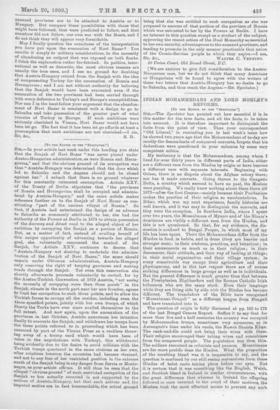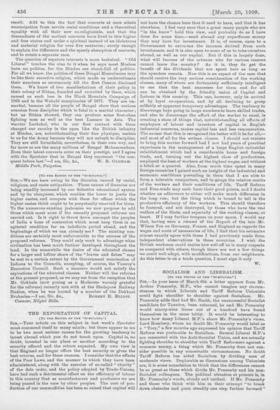INDIAN MOHAMMEDANS AND LORD MORLEY'S REFORMS.
[To THE EDITOR OW THE " SPEOTATOZ.1 SIR,—The Spectator has pointed out how essential it is in this matter for the true facts, and all the facts, to be taken into account. It is therefore important to distinguish the facts from the point of view. Thus your correspondent
" Old Liberal," in reminding you in last week's issue how he showed two years ago that the Mohammedans of to-day are mostly the descendants of conquered converts, forgets that his deductions were questioned in your column; by some very competent critics.
My testimony is that the Mohammedans, among whom I lived for over thirty years in different parts of India, either are a different race from the Hindus by origin or have become a different race with separate interests. Beginning with Orissa, there is no dispute about the Afghan colony there; nor has it made converts. Going thence to the Gangetic Delta, a country which seemed to have no past, the Moslem were puzzling. We really knew nothing about them there till 1873—after the first Census—mainly because their Puritanism makes the practice of their religion so unostentatious. In Bihar, which was my next experience, family histories arc well known, and it was easy to distinguish the converts, and they were the exception. In Southern India, where I spent over two years, the Ilussulmams of Mysore and of the Nizam's dominions are visibly a different race from the Hindus, and this is not questioned. So that, for my evidence„ the dis- cussion is confined to Bengal Proper, in which most of my life has been spent. There the Mohammedans differ from the Hindus in food, in habits, and in dress (they are heavier and stronger men); in their customs, practices, and behaviour; in their amusements as much as in their religion; in their demeanour, their attitude, and their way of looking at things; in their social organisation and their village system; in every conceivable way except their agrieulture and their physiognomy, and in this last respect there are of course striking differences in large groups as well as in individuals. But the general difference is much greater than that between the Presbyterian Highlanders and the Roman Catholic Irish tribesmen who are the same stock. Even their language while they are living side by side with the Hindus has become different. The translators of the Bible have recognised " Mussulmani-Dengali " as a different tongue from Bengali and have translated into it.
The question of origin is fully discussed at pp. 165 to 173 of the last Bengal Census Report Suftice it to say that for more than five and a half centuries the eountry was occupied by Mohammedan troops, sometimes very numerous, as in Aurangzeb's time under hie uncle, the Nawab Shaista Khan. The rank-and-file could not bring their wives with them. Their religion encouraged their taking wives ad concubines from the conquered people. The population was then thin. The soldiers remained as colonists and yeomen. Mussulinans are far more prolific than the Hindus. What the proportion of the resulting blend was it is imp:eligible to say, and the question is confused by our still seeing conversione from these Hindus of helot caste taking place before our eyes. But it is certain that it was something like the English, Welsh, and Scottish blend in Ireland in similar circumstances, with the great difference that whereas in Ireland the offspring followed or soon reverted to the creed of their mothers, the Moslem took the most effeetuai means to prevent any such result. Add to this the fact that converts at once attain emancipation from servile social conditions and a theoretical equality with all their new co-religionists, and that the descendants of the earliest converts have lived in thie higher and free status and under a spiritual instead of an idolatrous and material religion for over five centuries; surely enough to explain the difference and the speedy absorption of converts, and to create a separate race.
The question of separate interests is more technical. " Old Liberal" touches the clue to it when be says most Moslem have no politics, for the Hindus are chock-full of politics. For all we know, the politics of these Bengal Mussulmans may be like their secretive religion, which made us underestimate their numbers so enormously till the first Census disclosed them. We know of two manifestations of their policy in their colony of Sitana, founded and recruited by them, which caused us such loss in the Black Mountain Campaign of 1863 and in the Wahabi conspiracies of 1871. They are un- martial, because all the people of Bengal show that curious aversion from discipline which is fatal to a martial character ; but as Sititua showed, they can produce some first-class fighting men as well as the best Letecars in Asia. The warrior Larkekol, who in our first contact with them charged our cavalry in the open like the British infantry at Minden, are, notwithstanding their fine physique, useless to us for the Army because they will not submit to discipline. They are still formidable, nevertheless, in their own way, and far more so are the many millions of Bengal Mohammedans. Even their latest converts enter on their prestige, and I agree with the Spectator that in Bengal they represent "the con-
quest before last."—I am, Sir, Sen., W. B. OLDHAM. Middle Park, Paignton.











































 Previous page
Previous page